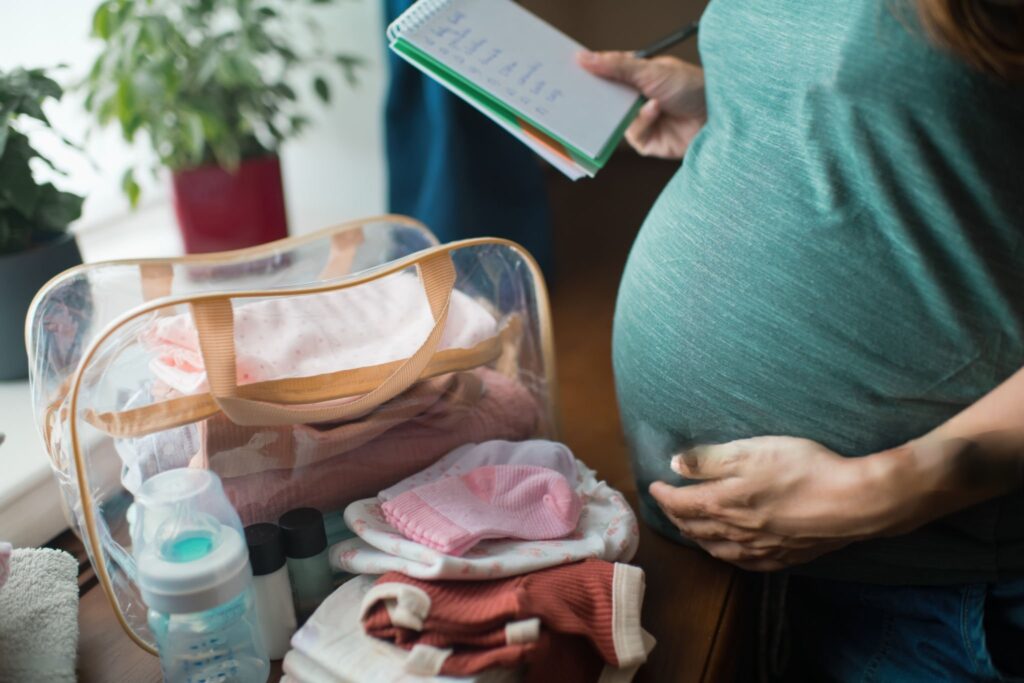As your due date approaches, preparing your hospital bag becomes a tangible step toward meeting your little one. After supporting thousands of birthing mothers as a midwife and delivering five babies of my own, I’ve seen firsthand how proper hospital bag must-haves can make a significant difference in your birth experience and those precious first days with your newborn. Let me guide you through packing thoughtfully, efficiently, and with confidence—because the last thing you need during labor is worrying about forgotten essentials!
When to Pack Your Hospital Bag
One question I hear constantly in my practice: “When should I pack my hospital bag?” I always recommend having your hospital bag must-haves ready by 36 weeks, even if your due date is still a month away. Why so early? Because approximately 10% of babies arrive before 37 weeks, and feeling prepared brings tremendous peace of mind.
Early Birds and Last-Minute Packers
I still remember the look on my sister-in-law’s face when her water broke at 35 weeks with her first baby. Between excited phone calls and contractions, she was frantically throwing random items into a duffel bag, forgetting essentials like her phone charger and going-home outfit for the baby. Meanwhile, other expectant mothers in my practice have had bags sitting by the door since 28 weeks!
There’s no perfect time that suits everyone, but I’ve observed that:
First-time mothers often benefit from packing earlier (around 34-35 weeks) to reduce anxiety as the due date approaches.
Experienced mothers may wait until 36-37 weeks, especially if they’ve had full-term babies previously.
Those with pregnancy complications or multiples should consider packing by 32 weeks, as their chances of early delivery are higher.
My practical compromise? Start gathering items around 32 weeks, pack most of your bag by 35 weeks, and have everything completely ready by 37 weeks. This staggered approach helps manage the task without feeling overwhelmed.
Creating a Three-Stage Packing Plan
When I was expecting my fourth baby, I developed a three-stage packing system that I now recommend to all my clients:
- The “Labor Essentials” Bag – A small bag with only what you’ll need during active labor
- The “Postpartum Stay” Bag – Items for your hospital recovery period
- The “Going Home” Bag – Outfits and items needed only for discharge day
This approach offers multiple advantages. First, you won’t be rummaging through a massive bag during labor trying to find comfort items. Second, your partner can easily grab the “Postpartum Stay” bag after delivery without disturbing your carefully packed items. And third, the “Going Home” bag can stay in the car until needed.
According to What to Expect, having separate bags for different stages helps partners and support people know exactly what to reach for during each phase of your hospital stay.
Essential Hospital Bag Must-Haves for Labor and Delivery
The items you’ll want during labor focus on comfort, documentation of the experience, and helping you through the intensity of birth.
Comfort Items That Make a Difference
Labor is called “labor” for good reason—it’s hard work! Small comforts can make a significant difference in how you experience this challenging but rewarding process.
Comfortable labor outfit options: While many women end up in hospital gowns, having alternatives can help you feel more at ease. Consider:
- A loose, soft nightgown that opens in front (if you plan on getting an epidural, make sure it opens in the back)
- A comfortable sports bra or nursing bra
- A warm robe that opens in front
- Cozy socks with grip bottoms
During my third labor, I brought a soft cotton nightgown from home that made me feel more relaxed and less like a “patient.” That subtle mindset shift helped me stay calmer through contractions.
Personal comfort tools: These vary widely between women, but consider:
- Your own pillow with a non-white pillowcase (so it doesn’t get mixed up with hospital pillows)
- A small handheld fan (labor can make you surprisingly hot!)
- Lip balm (breathing techniques often lead to dry lips)
- Hair ties or clips to keep hair off your face
- Massage tools like tennis balls or a roller
- A water spray bottle for facial refreshment
I’ve seen the humble lip balm become a surprisingly critical item in many births. One mother in my practice said, “I could handle the contractions, but the dry lips were driving me crazy!” Small comforts can have outsized importance during intense experiences.
Sensory environment enhancers:
- A small Bluetooth speaker for playing calming music or guided meditations
- Battery-operated flameless candles if you want a calmer atmosphere
- Essential oils in labor-friendly scents (lavender and peppermint are popular, but check your hospital’s policy first)
- An eye mask if you’re sensitive to hospital lighting
Remember that hospitals prioritize function over ambiance, so bringing elements that transform the space can help you feel more at ease in an unfamiliar environment.
Documentation Essentials
Birth is a once-in-a-lifetime experience for each baby, and many families want to document these precious moments.
Camera or fully-charged phone: Even if you don’t think you’ll want photos during labor, you’ll likely want them after baby arrives. Make sure your camera or phone has plenty of available storage space.
Chargers with extra-long cords: Hospital beds are often not near outlets! A 10-foot charging cable can be a lifesaver.
Birth plan copies: Bring 3-5 copies of your birth preferences document to share with nursing staff during shift changes.
One mother in my practice created a simple one-page birth plan with visual icons instead of lengthy text, making it easy for busy hospital staff to quickly understand her preferences. Creative approaches like this can enhance communication during an intense time.
Sustenance and Support
Labor can be unpredictable in length, and supporting your energy is important.
Snacks for you and your support person: Check your hospital’s policy on eating during labor. Even if you’re limited, your support person will definitely need sustenance! Some good options:
- Trail mix or nuts
- Energy bars
- Honey sticks for quick energy
- Electrolyte drinks or tablets
Support person essentials: Help your partner or support person prepare with:
- Comfortable clothes and layers (hospitals can be chilly)
- Their own toiletries
- Entertainment for slow periods (book, tablet, etc.)
- A list of people to update after baby arrives
- Cash for vending machines
- Their own pillow and blanket if planning to stay overnight
During my fifth delivery, my husband was much better prepared than during our first. He brought his own “support person bag” with everything he needed to remain comfortable while supporting me—which meant he could focus entirely on my needs rather than his own discomfort.
Hospital Bag Must-Haves for Your Postpartum Stay
After delivery, your needs will shift dramatically as you recover and begin caring for your newborn.
Recovery Essentials for New Mothers
The postpartum period brings physical challenges that the right supplies can help ease.
Comfortable, practical clothing:
- 2-3 nursing-friendly nightgowns or pajama sets
- A warm, front-opening robe
- 1-2 nursing bras or comfortable sports bras
- High-waisted, dark-colored underwear (many mothers prefer disposable options initially)
- Loose, comfortable going-home outfit (think maternity clothes, not pre-pregnancy size!)
After my first delivery, I made the mistake of bringing cute but impractical pajamas. By baby #3, I knew better—front-opening nightgowns that allowed for easy nursing and medical checks were worth their weight in gold.
Personal care items:
- Your own toiletries (hospitals provide basics, but your own products will feel luxurious)
- Dry shampoo (for when a shower isn’t possible)
- Face wipes for quick refreshing
- Heavy-flow menstrual pads if you prefer specific brands (though hospitals will provide these)
- Peri bottle (some mothers prefer their own, though hospitals typically provide one)
- Soothing witch hazel pads or spray
- Nipple cream if planning to breastfeed
According to the American College of Obstetricians and Gynecologists, proper perineal care is essential for recovery, making items like soothing pads and peri bottles important hospital bag must-haves.
Comfort and convenience items:
- Your own towel (hospital towels tend to be small and rough)
- Slippers with non-slip soles
- Flip-flops for showering
- A nursing pillow if you have a favorite
- Extra pillows if you have specific needs
- Earplugs and eye mask (hospitals can be noisy and bright, even overnight)
One mother in my practice brought her own blanket from home, and it provided unexpected emotional comfort during her recovery. The familiar smell and feel created a sense of security in the clinical environment.
Baby’s First Days Essentials
Your newborn needs surprisingly little in the hospital, as most necessities are provided, but certain personal items can enhance baby’s comfort and your experience.
Clothing and accessories:
- 2-3 side-snap or kimono-style shirts (easier than over-the-head options)
- 2-3 footed sleepers
- 1-2 swaddle blankets (though hospitals usually provide these)
- Hat and socks if the season requires
- Special “going home” outfit if desired
I always recommend parents bring clothes in two sizes—newborn and 0-3 months—since it’s hard to predict your baby’s exact size before birth. My second baby completely skipped newborn sizes and went straight to 0-3 months!
Specialized care items:
- Your own diapers if you prefer cloth or a specific brand (hospitals provide disposables)
- Wipes if you prefer a specific type (hospitals provide these too)
- Any special skincare products you plan to use (though minimal is best for newborns)
Most hospitals provide all necessary care items for baby, so don’t overpack in this category.
Special Considerations for Your Hospital Stay
Every birth experience is unique, and certain circumstances might require additional hospital bag must-haves.
Planning for Different Types of Births
Different birth experiences may require slightly different preparations:
For scheduled C-sections, consider:
- High-waisted underwear that won’t irritate your incision
- A small pillow to hold against your abdomen when laughing, coughing, or moving
- Loose dresses rather than pants for comfort
- Stool softeners (check with your provider first)
After my friend’s C-section, she mentioned that the small heart-shaped pillow she brought to brace against her incision was the most valuable item in her hospital bag.
For inductions, pack:
- Extra entertainment options (inductions often take longer)
- Additional comfort items for an extended stay
- More snacks and support person supplies
For potential NICU stays (if you know in advance this might be necessary):
- A journal to track baby’s progress and your feelings
- Extra pumping supplies
- Hand sanitizer
- A small photo of your baby to keep with you if you’re separated
Technology Considerations
In our digital world, staying connected requires some planning:
Communication tools:
- Fully charged devices with backup power banks
- Your hospital’s WiFi information (often available on their website)
- A list of contacts to update once baby arrives
- Any video call setup if family members will “meet” baby virtually
Entertainment options:
- Downloaded movies, shows, or books (hospital WiFi can be unreliable)
- Headphones
- A tablet or e-reader
During my last delivery, I had audiobooks downloaded that I could listen to during early labor. They provided a welcome distraction and helped me stay relaxed during the early hours.
Preparing for the Trip Home
The final category of hospital bag must-haves focuses on your transition home with your new baby.
Mom’s Going-Home Necessities
Your departure from the hospital requires specific items:
Practical clothing:
- A going-home outfit that’s comfortable and seasonally appropriate
- Slip-on shoes (bending over might be challenging)
- A nursing-friendly top if breastfeeding
After delivery, I remind my clients that they’ll still look about 5-6 months pregnant when leaving the hospital. Your most comfortable mid-pregnancy clothes are usually ideal for the trip home.
Practical considerations:
- Any prescriptions you’ll need to take home
- Discharge paperwork organizer
- Contact information for your pediatrician and any follow-up appointments
Baby’s First Journey Essentials
Your baby’s first car ride needs careful preparation:
Safety essentials:
- Properly installed infant car seat (hospitals require this before discharge)
- Weather-appropriate covers or blankets
- Seasonally appropriate hat
Comfort items:
- Pacifier if you plan to use one
- Small toy or comfort object if desired
One winter baby in my practice had a clever mom who pre-warmed the car and car seat by having dad start the vehicle about 20 minutes before discharge. This thoughtful preparation made their December baby’s transition much more comfortable.
Final Tips from a Veteran Mom and Midwife
After packing for my own five births and helping thousands of mothers prepare for theirs, I’ve learned a few extra tricks worth sharing:
Practical Packing Strategies
Use clear zip-top bags to organize categories of items—one for toiletries, one for baby clothes, one for important documents. This simple organization system makes finding what you need much easier, especially for partners or support people who might not know where things are packed.
Label everything you bring, particularly chargers and pillows which can easily blend in with hospital equipment.
Pack a separate small “labor bag” with just the essentials for the delivery room, keeping the larger postpartum bag accessible but out of the way until needed.
Consider a rolling suitcase rather than a duffel bag for easier transport through hospital corridors.
Leave room for hospital mementos and gifts you might receive.
What You Can Skip
Many first-time parents overpack, bringing items the hospital already provides or that prove unnecessary. Generally, you can skip:
- Abundant baby supplies (diapers, wipes, blankets)
- Extensive makeup or hairstyling tools
- Multiple outfit options for baby
- Valuable jewelry or sentimental items that could get lost
- Scented products (many hospitals have fragrance-free policies)
I’ll never forget one determined mom who arrived with a suitcase containing her own birth ball, LED candles, essential oil diffuser, speaker, fairy lights, and birth affirmation cards. While her preparation was admirable, she used almost none of it as her labor progressed rapidly! Sometimes simple is better.
The Ultimate Hospital Bag Checklist
To make your packing straightforward, here’s a concise list of hospital bag must-haves to reference:
For Labor:
- Photo ID, insurance card, and hospital paperwork
- Birth plan copies
- Comfortable labor clothes
- Personal comfort items (lip balm, hair ties, etc.)
- Phone and charger with extra-long cord
- Small speaker for music if desired
- Camera if separate from phone
- Snacks and drinks for support person
For Postpartum Stay:
- Nursing-friendly nightgowns/pajamas
- Robe and slippers
- Toiletries and personal care items
- Nursing bras if breastfeeding
- Comfortable underwear
- Peri care items if you have preferences
- Entertainment options
- Earplugs and eye mask
For Baby:
- Going-home outfit in two sizes
- Additional basic clothing items
- Installed car seat (kept in your car)
- Swaddle blanket if you have a preferred type
For Going Home:
- Comfortable going-home clothes for mom
- Seasonally appropriate clothes for baby
- Discharge paperwork organizer
Remember that your hospital bag must-haves might differ based on your unique needs and preferences. Use this list as a starting point, then customize based on your specific situation and hospital’s policies.
Packing your hospital bag isn’t just practical preparation—it’s a meaningful ritual that helps you mentally prepare for the incredible journey of birth and meeting your little one. As you fold tiny clothes and gather comfort items, you’re creating space in your life and heart for the new little person about to join your family. Approach this task with joy and anticipation, knowing that soon enough, you’ll be returning home with the most precious cargo you’ve ever carried.



